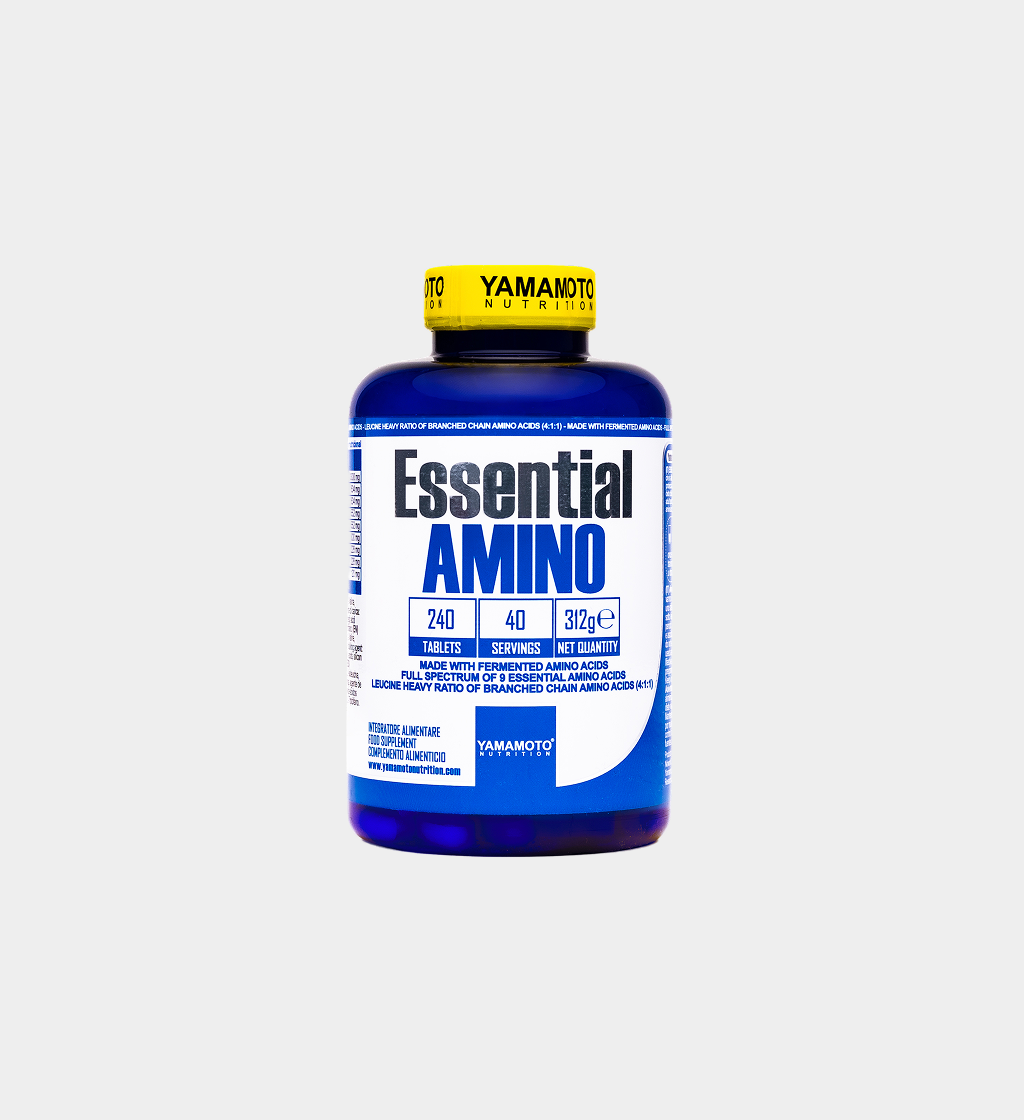Essential AMINO
240 Tablets
150 AED
Matrix of essential amino acids obtained 100% from plant fermentation, with a ratio of l-leucine, l-isoleucine, l-valine: 2:1:1 to promote protein synthesis.
- 100% essential amino acids obtained from plant fermentation;
- The optimal support for your performance;
- Support protein synthesis and muscle mass development;
- Counteract muscle catabolism;
- L-leucine, l-isoleucine, l-valine ratio of 2:1:1 and added l-histidine.
Essential AMINO is a matrix composed of 100% essential amino acids, obtained through vegetable fermentation. Essential amino acids (EAAs – Essential Amino Acids) are those that the human body is unable to synthesise independently in sufficient quantities to meet its needs, and which must therefore be obligatorily consumed via the diet. It is important to remember that the EAA also includes branched chain amino acids, known as BCAA (Branched Chain Amino Acids), and that amino acids are the organic molecules that our bodies use to form proteins.
**What is an essential amino acid supplement for?
When food alone is not enough to meet requirements or when the amount consumed of certain foods is reduced, EAA supplements are a valuable aid in providing the body with everything it needs for protein synthesis.
Essential AMINO features a l-leucine, l-isoleucine and l-valine ratio of 2:1:1, so with greater leucine presence: this amino acid is in fact essential for protein synthesis. Essential AMINO also contains all 8 EAAs in an optimal ratio to maximise bioavailability and minimise nitrogenous waste production.
**What are the essential amino acids (EAAs) for humans?
For the (adult) human being, there are eight essential amino acids, specifically:
- Lysine: found mainly in milk, soya, beef, but almost absent in cereals, it is used to form carnitine and vitamin B3. For athletes, it can speed up post-workout recovery.
- Tryptophan**: found in milk and dairy products, eggs, legumes, meat and fish. It is an important amino acid in protein synthesis, and is the starting point in the synthesis of serotonin and niacin.
- Phenylalanine**: found in most animal and vegetable proteins, i.e. in meat, offal, fish, eggs and even brown rice. It is involved in many metabolic processes, also used as a ‘structural building block’ of proteins, and is involved in the formation of thyroid hormones.
- Threonine**: found mainly in maize, soya, eggs, mushrooms, cod, pork, lamb, rabbit and veal. It is one of the amino acids most easily missed in the vegan diet. It is a constituent of antibodies, and therefore plays a key role in maintaining the immune system.
- Methionine: found in dairy products, egg whites, sesame seeds, Brazil nuts, cod and soy protein. Methionine is the basis for the production of carnitine and cysteine, as well as creatine, taurine and vitamin B12. It has a chelating effect on certain heavy metals and if present in sufficient quantities acidifies the pH of urine.
- Leucine: milk, maize, chicken and eggs are the main dietary sources of this amino acid. It plays an important role at the muscular level, and is an alternative source of energy during intense sporting activity.
- Isoleucine: found mainly in maize, potatoes, chicken, eggs, peanuts, bresaola, lamb. It is closely linked to glucose requirements (it is in fact defined as a glucogenic and ketogenic amino acid), prevents structural protein catabolism and promotes recovery after prolonged exertion.
- Valine**: the following are rich in it: egg white powder, soya protein, Spirulina algae, dairy products and dairy products. It plays important roles particularly in tissue reconstruction.
Of these 8 EAAs, the last 3 described (Leucine, Isoleucine and Valine) are known as BCAAs (from Branched Chain Amino Acid), i.e. branched amino acids, accumulated by the presence of a branched side chain.
For growing individuals, a ninth amino acid is also included as essential: histidine.
Scientific references
Francesco S. Dioguardi, Amino acids: letters of an alphabet older than life, InfoMedica Synthesis, 2018
Francesco S. Dioguardi, Clinical use of amino acids as dietary supplement: pros and cons. J Cachexia Sarcopenia Muscle. 2011 Jun
Bonfili L et Al, Essential amino acid mixtures drive cancer cells to apoptosis through proteasome inhibition and autophagy activation, FEBS J. 2017
D’Antona G, Ragni M, Cardile A, Tedesco L, Dossena M, Bruttini F, Caliaro F, Corsetti G, Bottinelli R, Carruba MO, Valerio A, Nisoli E. Branched-chain amino acid supplementation promotes survival and supports cardiac and skeletal muscle mitochondrial biogenesis in middle-aged mice. Cell Metab. 2010 Oct 6;12(4):362-372. doi: 10.1016/j.cmet.2010.08.016. PMID: 20889128.
Dillon EL. Nutritionally essential amino acids and metabolic signaling in aging. Amino Acids. 2013;45(3):431-441. doi:10.1007/s00726-012-1438-0
Volpi E, Kobayashi H, Sheffield-Moore M, Mittendorfer B, Wolfe RR. Essential amino acids are primarily responsible for the amino acid stimulation of muscle protein anabolism in healthy elderly adults. Am J Clin Nutr. 2003;78(2):250-258. doi:10.1093/ajcn/78.2.250.
Drummond MJ, Glynn EL, Fry CS, Timmerman KL, Volpi E, Rasmussen BB. An increase in essential amino acid availability upregulates amino acid transporter expression in human skeletal muscle. Am J Physiol Endocrinol Metab. 2010 May;298(5):E1011-8. doi: 10.1152/ajpendo.00690.2009. Epub 2010 Feb 9. PMID: 20304764; PMCID: PMC2867366..
Børsheim E, Tipton KD, Wolf SE, Wolfe RR. Essential amino acids and muscle protein recovery from resistance exercise. Am J Physiol Endocrinol Metab. 2002 Oct;283(4):E648-57. doi: 10.1152/ajpendo.00466.2001. PMID: 12217881
| Nutritional Information | Per Daily Dose 6 tablets |
|---|---|
| L-Leucine | 2500 mg |
| L-Isoleucine | 1250 mg |
| L-Valine | 1250 mg |
| L-Lysine | 300 mg |
| L-Phenylalanine | 250 mg |
| L-Threonine | 250 mg |
| L-Histidine | 250 mg |
| L-Methionine | 200 mg |
| L-Tryptophan | 120 mg |
| Total | 6.370 g |
Directions for use: we recommend taking 1 to 6 tablets per day, before or after physical activity, to be swallowed with a glass of water.
Warnings: Do not exceed the recommended daily dose. Keep out of reach of children under 3 years of age. Food supplements are not intended as a substitute for a varied and balanced diet and a healthy lifestyle. Do not use during pregnancy and in children, or for prolonged periods without consulting a doctor.
Allergen declaration: Based on the technical data sheets of the raw materials, the product does not contain and is not made up of substances that cause allergies or intolerances listed in Annex II of Reg. (EU) No. 1169/2011.
Anti-doping statement: No prohibited substances listed in the WADA 2023 list are used as raw materials in the products and none of these substances are present as raw materials in our production plant. No tests are performed for these substances in the finished product
Storage instructions: Store in a cool, dry place, away from direct sunlight and localized heat sources. The minimum shelf life refers to the product correctly stored, in intact packaging. Do not disperse in the environment after use.
You must be logged in to post a review.



Reviews
There are no reviews yet.